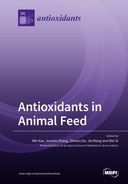Explore

Antioxidants in Animal Feed
0 Ungluers have
Faved this Work
Login to Fave
This includes 17 original research articles and focuses on the knowledge on the effects of dietary antioxidants on host health and performance of production animals, including livestock, poultry and fish. It provides various nutritional approaches to improve antioxidant capacity and benefit host health in animal production. Production animals exposed to air pollution, heavy metals, or other stressful conditions can experience oxidative stress that may suppress animal health, performance, and production, subsequently impacting economic feasibility; hence, maintaining and improving oxidative status, especially through an appropriate nutrition strategy, are essential for normal physiological processes in animals. Promising research results have revealed that the administration of natural or synthetic antioxidants in an animal’s diet may be an important strategy to mitigate the negative influence induced by oxidative stress conditions. The Special Issue has been conceived to set out the knowledge on the effects of dietary antioxidants on host health and performance of production animals. It provides various nutritional approaches, mainly including vitamins, plant extracts, trace elements, non-essential amino acids, etc., to improve antioxidant capacity and benefit host health in livestock, poultry and fish. This book will encourage more scientists to move forward on the path to increasing knowledge on the effect of natural or synthetic antioxidants on the growth and health of production animals.
This book is included in DOAB.
Why read this book? Have your say.
You must be logged in to comment.
Rights Information
Are you the author or publisher of this work? If so, you can claim it as yours by registering as an Unglue.it rights holder.Downloads
This work has been downloaded 78 times via unglue.it ebook links.
- 78 - pdf (CC BY) at Unglue.it.
Keywords
- acetate
- acidifier
- Acremonium terricola culture
- animal feed
- antioxidant
- antioxidant capacity
- Antioxidants
- Apoptosis
- Aquaculture
- Autophagy
- bacterial composition
- Biology, Life Sciences
- calf
- calves
- cecal microbiota
- channel catfish
- conventional soybean meal
- dairy cow
- Disease Resistance
- Docosahexaenoic acid
- fetal growth
- flesh quality
- follicle atresia
- functional additives
- glutamine
- grass carp
- growth performance
- high starch
- high-carbohydrate diet
- hypoxia
- Immune response
- Immunity
- Inflammation
- inflammatory response
- intestinal flora
- intestinal health
- L-Gln
- Lactobacillus plantarum
- largemouth bass
- Larimichthys crocea
- Lateolabrax japonicas
- Lipid Metabolism
- lipopolysaccharide
- Liver
- Mathematics & science
- Melatonin
- metabolic liver disease
- metabolomics
- methionine
- Microbiology (non-medical)
- milk performance
- milk replacer
- Mitochondria
- mTOR signaling
- n/a
- Nrf2 signaling
- Nrf2/Keap1 signaling pathway
- ovary stress biomarker
- oxidative damage
- Oxidative Stress
- palmitic acid
- piglets
- Placenta
- Plant protein
- Proteomics
- redox enzyme
- Reference, information & interdisciplinary subjects
- Research & information: general
- rumen-protected
- rumen-protected glucose
- signaling pathway
- SIRT1-P53/FoxO1 pathway
- sow
- sows
- Spirulina
- tissue damage
- toll-like receptor
- transcriptome
- uridine
- vitamin A
- Vitamin C
- weaned pigs
- weaning stress
Links
DOI: 10.3390/books978-3-0365-5472-3Editions

